Nguyen Dynasty: Last Royal Family in Vietnam with 13 Kings
Nguyen Dynasty in Hue Vietnam: If you are history buff and visiting to Vietnam, Hue city is definitely a Must-Visit in your list. It was served as the Last Royal Ancient Capital of the Nguyen Dynasty (1802 - 1945) before Ho Chi Minh started Democratic Republic of Vietnam and Hanoi was choosen to be the Capital for the whole Country. During 143 year being the seat of the Nguyen Dynasty, we had 13 Nguyen's Kings to rule the Country, and here is the Family Tree of our Nguyen Dynasty with 13 Nguyen Emperors:
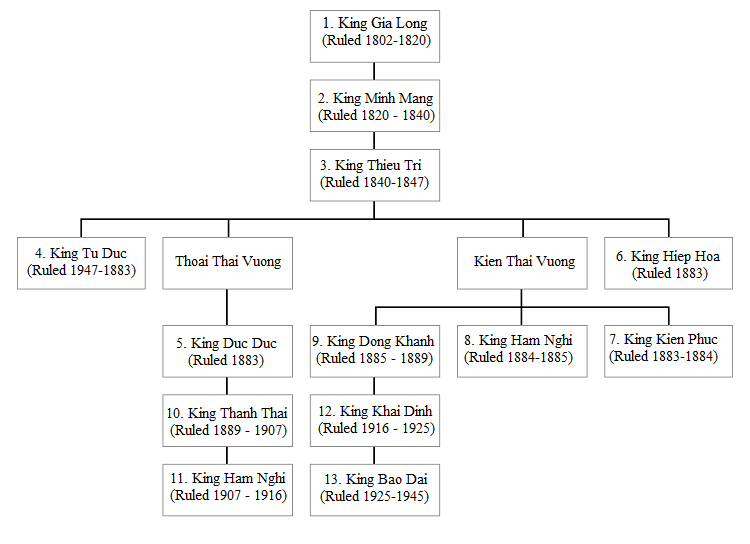
1. Emperor Gia Long: Gia Long (Real name: Nguyen Anh) is the grandson of Lord Nguyen Phuc Khoat, the penultimate Lord Nguyen in Dang Trong. After the Nguyen family was overthrown by the Tay Son army in 1777, he fled and began a 25-year war with Tay Son to restore his throne.
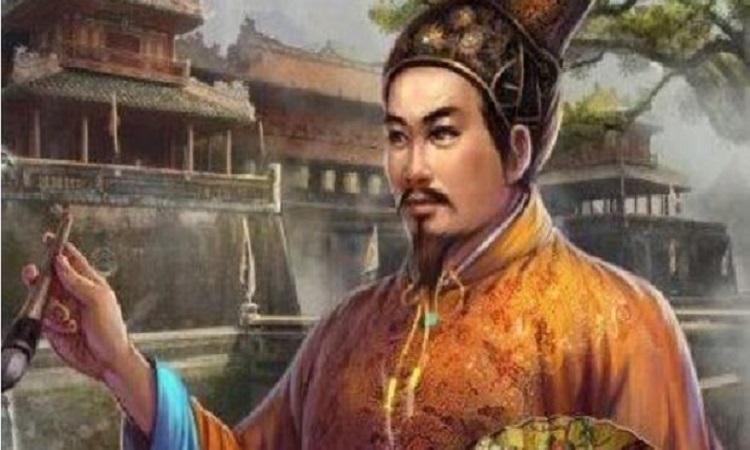
Initially, Nguyen Anh suffered many great failures, had to appeal to the Siamese army and promised to cut the territory of the country for France so that the two countries would send troops to attack Tay Son. Nguyen Anh and Le Chieu Thong were the only two kings in Vietnamese history, who led the way for foreign troops to attack the country's territory.
The foreign appeal to restore the throne of Lord Nguyen led him to be criticized later by historians. Gia Long ruled the country for 18 years from 1802 to 1820. He had 21 wives amd concubines with 13 princes and 18 princess.
2. Emperor Minh Mang: Minh Mang was born May 25, 1791, the second emperor of the Nguyen Dynasty of Dai Nam. He reigned from 1820 until his death in 1941 and was worshiped as a temple of Nguyen Thanh To. Despite a limited number of erroneous policies, contemporary historians still regard Minh Mang as the most popular King of the Nguyen Dynasty.
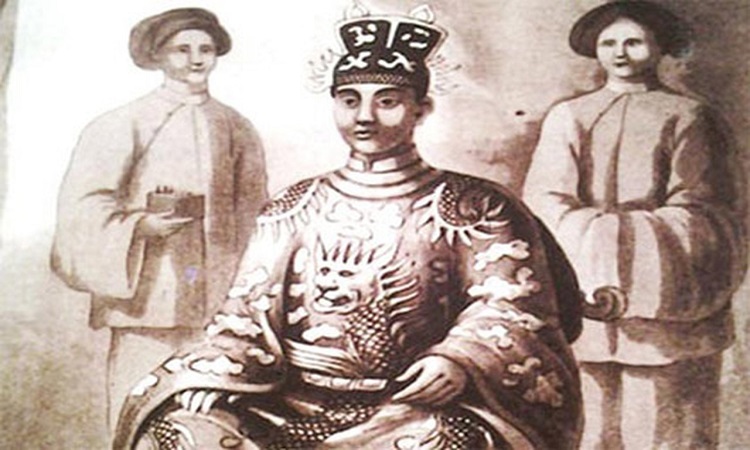
During 21 years of reign, Minh Mang proclaimed a series of internal reforms. Minh Mang also sent officials to urge the reclamation in the northern and southern coasts. In addition, he was very interested in maintaining Confucian education, in 1822 he reopened the Royal exams in the capital to recruit talents. He strictly prohibited the spread of Christianity because he thought it was the evil religion that undermined the national tradition.
Regarding foreign affairs, Minh Mang did not introduce any reform, he continued to maintain Gia Long's policy: to isolate and reject all exchanges with the West, to prohibit people from trading with foreign countries, making Dai Nam gradually lagging behind in not acquiring new scientific and technical achievements. Minh Mang ruled the country for 20 years from 1820 to 1841. He had about 500 wives and concubines with 78 princes and 64 princess.
3. Emperor Thieu Tri: Thieu Tri, whose name was Nguyen Phuc Mien Tong. He was the eldest son of King Minh Mang and Queen Ho Thi Hoa, born on June 16, 1807 in Hue.
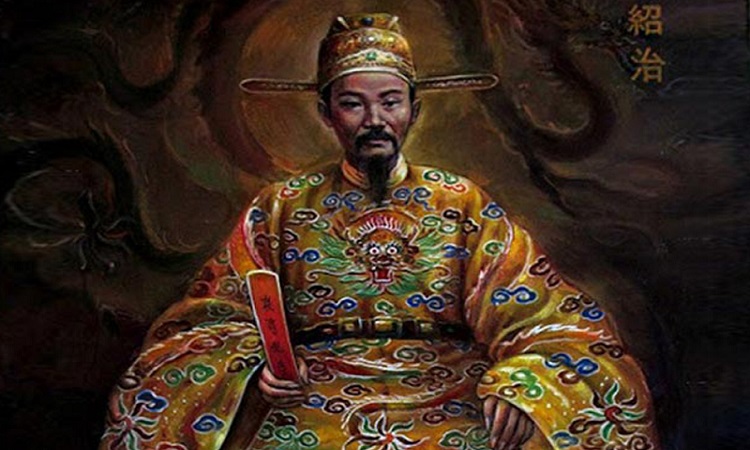
Thieu Tri is described by history books as an intelligent emperor, devoted to taking care of the country, erudite in Confucianism, and loved poetry. But Thieu Tri did not introduce any new reforms, only maintaining administrative, economic, educational, legal, military policies... from the time of Minh Mang. When Thieu Tri ascended the throne, Minh Mang's expansionist policy made Dai Nam's territory the largest in history.
Thieu Tri also had to deal with the growing threat of invasion from the French. The climax was the battle of Da Nang estuary (1847) when the French army sank 5 copper boats of Dai Nam's navy. This defeat made the emperor very angry and worried, but until his death, Thieu Tri and his officials still could not find a reasonable way to deal with it.
Ten years after the death of Thieu Tri (1858), the French invaded Dai Nam, opening the period when Vietnam was under French domination. He had about 39 wives and concubines with 29 princes and 35 princess.
4. Emperor Tu Duc: Nguyen Phuc Hong Nham was born on September 22, 1829 in Hue, the second son of Thieu Tri and Pham Thi Hang (Mrs. Tu Du). When he was young, Hong Nham had another name: Nguyen Phuc Thi. In addition, according to the Nguyen Phuc royal tradition dating from the time of Lod Nguyen Phuc Khoat, the prince born to be easy to raise will be given the name Me, so in his childhood he was also known as Me Triu.
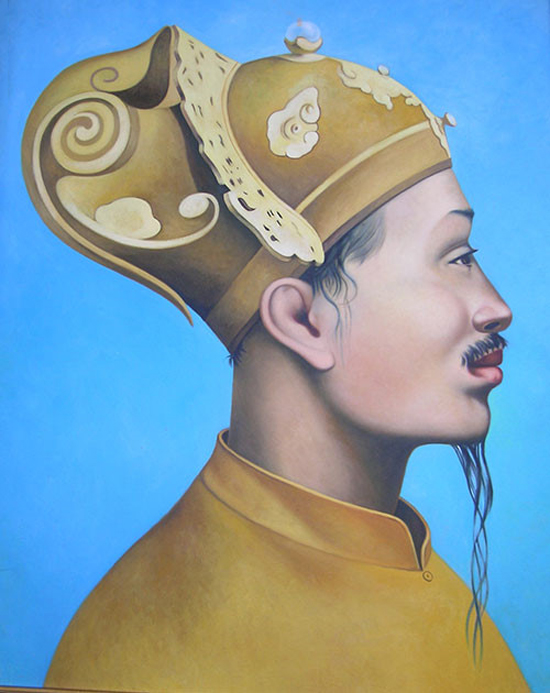
Because his brother, Nguyen Phuc Hong Bao, was an avid gambler, refusing to study, King Thieu Tri transfer the throne to him. He was only 19 years old, but his education was wise. In October 1847, he was officially crowned Emperor in Thai Hoa Palace, naming himself Tu Duc, starting the following year in 1848. When Tu Duc came to power, the court ruled in Confucian style.
Tu Duc ruled the country for 36 years from 1847 to 1883. But in 1858, French first time came to occupy our country, and step by step Tu Duc had to sign a treaty reconiging the domination of the french in the whole country in 1883. Tu Duc had 103 wives and concubines but no children due to mumps disease when he was 20 year old. So he adopted 3 nephews to become adopted sons.
5. Emperor Duc Duc: Duc Duc was born on February 23, 1852 in Hue. Sources say he was born on 4 January onFebruary 11, 1853. He was the second son of Thoai Thai king Nguyen Phuc Hong Y (the fourth son of Thieu Tri king) and Mrs. Tran Thi Nga, self-proclaimed Ung Ai.
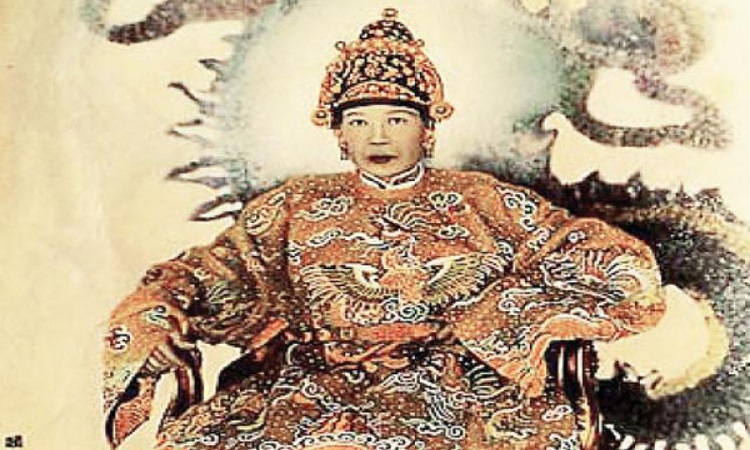
In 1869, when he was 17 years old, he was adopted by his biological father, King Tu Duc (because of mumps disease, so King Tu Duc had no children) and gave his name Ung Chan, and move to Duc Duc institute and entrusted Hoang Thi Phi Vu Thi Duyen to study In 1883.
After Tự Đức's death, his three regents, Nguyễn Văn Tường, Tôn Thất Thuyết and Tran Tien Thanh, declared the thirty-one-year-old Dục Đức to become the King. This move was evidently controversial. Historian Pham Van Son and others write that Tự Đức had determined Dục Đức too decadent to rule, and amended his will to name Kiến Phúc as his successor instead. However, the Tam Cung, an alliance of powerful palace women, favored Dục Đức, and convinced the regents to alter the will and appoint him Emperor.
Dục Đức ruled for only three days (from 20th to 23rd Jul 1883) before he was deposed and sentenced to death by the same regents who had enthroned him. The reasons are unclear. He had 8 wives and concubines with 11 princes and 8 princess.
6. Emperor Hiep Hoa: Hiep Hoa, whose real name is Nguyen Phuc Hong Dat, when he ascended to the throne, changed his name to Nguyen Phuc Thang, born in Hue, the 29th and the youngest son of King Thieu Tri; Doan Tan's mother was Doan Thi Doan (some books read Thuan). His original title was Lang Quoc Cong. According to the tradition of the Nguyen Phuc royal family from the worship of Lord Nguyen Phuc Khoat, the princes born to be easy to raise often named after the Me, so when childhood, King Hiep Hoa also called Me Men.
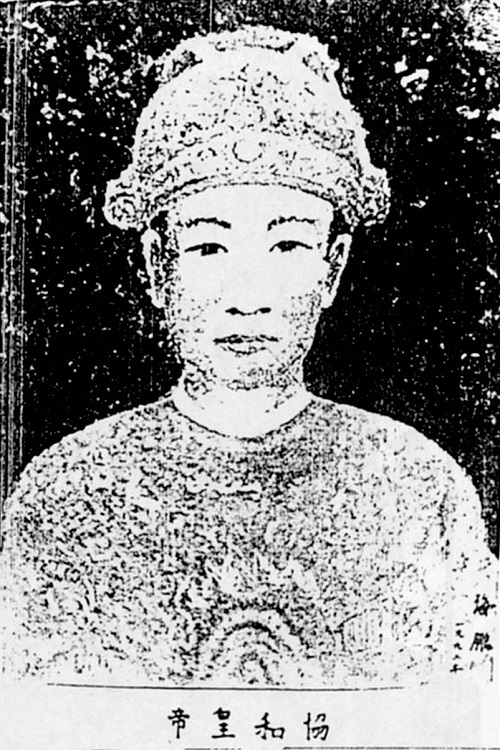
Hiep Hoa ruled the country for 4 months from 30th Jul to 29th Nov 1883. The King had 11 princes and 6 princess, only knowing that his second son, Ung Hiep, was heir to his elder brother, Phong Loc, the Duke and a queen named Ngoc Pha. His other two sons, Nguyen Phuc Ung Bac, practiced the style of Van Lang Huong Cong and Nguyen Phuc Ung Chuan.
7. Emperor Kien Phuoc: Kien Phuc was born February 12, 1869 - July 31, 1884), whose real name was Nguyen Phuc Ung Dang, was the seventh emperor of the Nguyen Dynasty in Vietnamese history. He ascended to the throne on December 2, 1883, at the position of 8 months, he passed away, was worshiped the temple is Gian Tong.
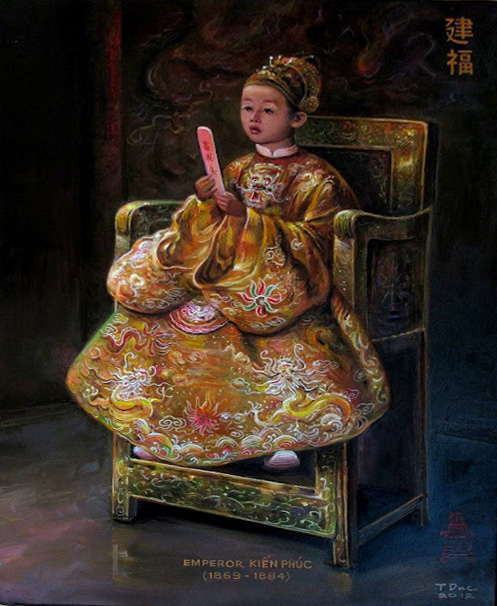
Under the reign of King Kien Phuc, on June 6, 1884, the Hue court signed with the French colonialists the Treaty of Giap Than (Patenôtre Peace), revising a number of things compared to the Treaty of Quy Mui but basically The version still recognizes the "protection" of France for the country of Vietnam.
King Kien Phuc was only king for 8 months, and became the most glorious monarch of the Nguyen Dynasty, when the King died just 15 years old. His death was closely related to Phi Phi Nguyen Van Thi Huong and Assistant Chief of Mission Nguyen Van Tuong.
8. Emperor Ham Nghi: Ham Nghi was born on August 3, 1871 - January 14, 1944, under the title De Xu, whose real name is Nguyen Phuc Ung Lich, the eighth emperor of the Nguyen Dynasty, the last feudal dynasty in Vietnamese history.
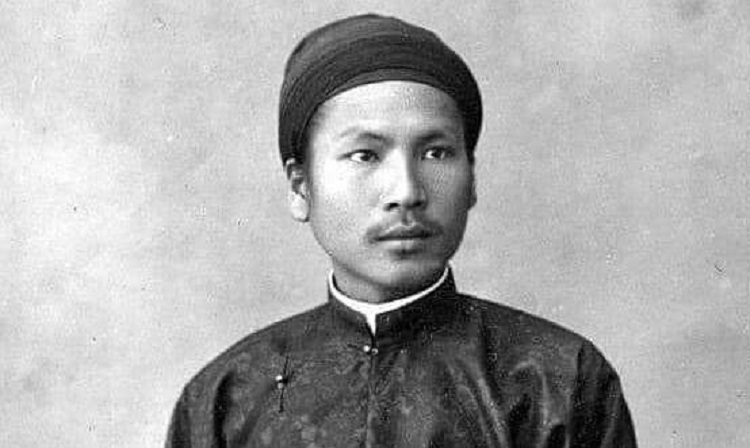
As the younger brother of King Kien Phuc, in 1884 Ham Nghi was taken to the throne by his chief assistants Nguyen Van Tuong and Ton That Thuyet at the age of 13. After the counterattack in Hue citadel failed in 1885, Ton That Thuyet brought him out and broadcasted Can Vuong against the French colonialists.
In his name, Ton That Thuyet launched the Can Vuong movement, calling for the prose and pro-government to help the king and the country. This movement lasted until 1888 when Ham Nghi was arrested. Later, he was taken to Algiers (capital of Algeria) and died here in 1943 due to stomach cancer. Due to French pressure, the Nguyen Dynasty did not give him a temple.
9. Emperor Dong Khanh: Dong Khanh was born on February 19, 1864, the fictitious names were Nguyen Phuc Ung Thi and Nguyen Phuc Ung Duong, ascended the throne to be named Nguyen Phuc Bien, the ninth emperor of the Nguyen Dynasty in history of Vietnam, ruled from 1885 to 1889.
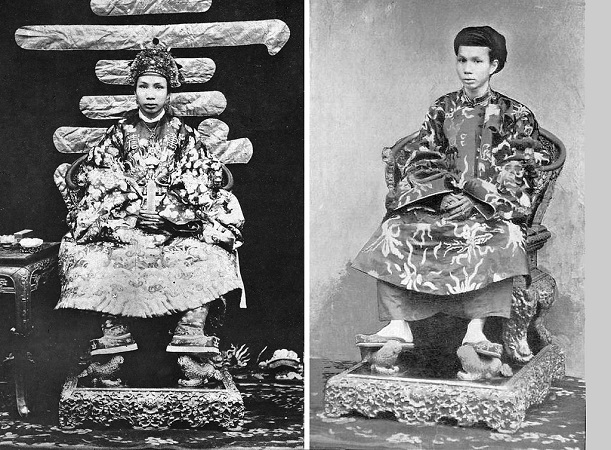
Dong Khanh was originally adopted by Emperor Tu Duc. In 1885, after the Hue court was defeated by the French army in the battle of Hue Citadel, Ham Nghi and Ton That Thuyet fled to Quang Tri. Dong Khanh was put on throne by French. During his reign, the French colonialists started the first works to establish a 60-year colonial period in Tonkin (North Vietnam) and Annam (Central Vietnam), while the Hue court showed its admiration and peace postponed. Did not dare to quarrel with the French, Dong Khanh advocated acquiring French civilization, using Western goods. It is for that reason that Vietnamese histories after the Nguyen era often regarded him as a reactionary king, who, for his own benefit, committed himself to being a puppet and a foreign henchman.
In early 1889, Dong Khanh was seriously ill and died when he was quite young, only reigned for 4 years, the temple was Canh Tong. His successor was Thanh Thai king. According to Dai Nam Luc Luc and Nguyen Phuoc Toc's descendants, King Dong Khanh had six sons and three daughters. However, the royal book of the Nguyễn clan states that he had 6 boys and 6 girls, but did not specify the names of the princesses.
10. Emperor Thanh Thai: His real name was Nguyen Phuc Buu Lan, ruled the country for 19 years from 1889 to 1907. When he ascended the throne to change to Nguyen Phuc Chieu. He was the 7th son of King Duc Duc and Mrs. Phan Thi Dieu, born on March 14, 1879 in Hue. He was the grandson of Thoai Thai Nguyen Nguyen Cardinal and great-grandson of King Thieu Tri.
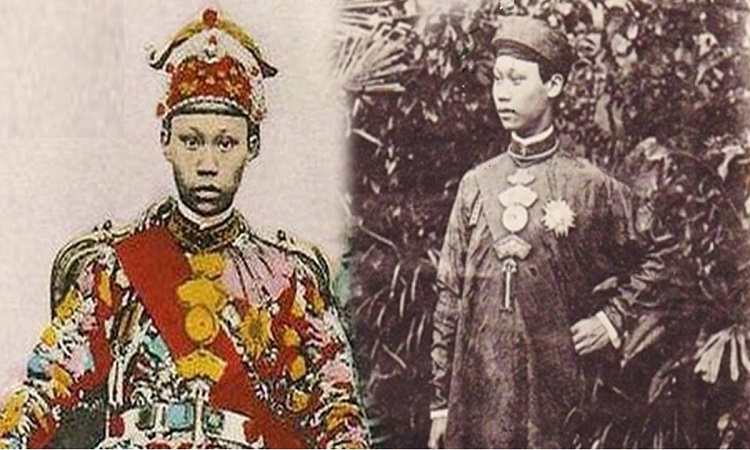
When he was four years old, Emperor Duc Duc was defeated and died in prison by two courtiers, Ton That Thuyet and Nguyen Van Tuong. When he was nine years old, his grandfather, Phan Dinh Binh (a high-ranking mandarin of the Ho household) was arrested and imprisoned by Dong Khanh King, who died after scolding Dong Khanh for flattery and pro-French when Dong Khanh went to Quang Binh to entice King Ham Nghi.
On January 28, 1889, the unfortunate King Dong Khanh passed away at the age of 24. At that time, Dong Khanh's son, Buu Dao, was only 3 years old, so he could not succeed the throne. At the Nunciature court, Mr. Diep Van Cuong was working as an interpreter. Diep Vong Cuong married Buu Lan's aunt, and also sympathized with King Duc Duc (brother-in-law), so he tried to find a way for his nephew to take the throne. He translated it to the Ambassador Rheinart in a completely different way from the Secret Institute. So Buu Lan was chosen to the throne when he was only 10 year old.
Thanh Thai is a patriotic king. He often pretended to be crazy to cover the eyes of the French and his minions. He also secretly trained the army and made weapons to wait for the opportunity to rebel against the French. However, when the incident was revealed. He was forced to abdicate and exiled to Reunion.
In early May 1945 (after King Duy Tan died), thanks to the advocacy of his daughter and son-in-law, the lawyer and wife Vuong Quang Nhuong and former emperor Thanh Thai were allowed to return to Vietnam. He and his family lived in Villa Anna in Cap Saint Jacques (present-day Vung Tau).
In March 1953, he was allowed to return to Hue to visit his parents' mausoleum. He died on March 20, 1954 in Saigon and was buried in the grounds of An Lang citadel (Duc Duc's mausoleum) in An Cuu commune, Huong Thuy district, Thua Thien province, at the age of 75.
11. Emperor Duy Tan: Real Name was Nguyen Phuc Vinh San. He ruled the country for 9 years from 1907 to 11916. Duy Tan was born on September 19, 1900.
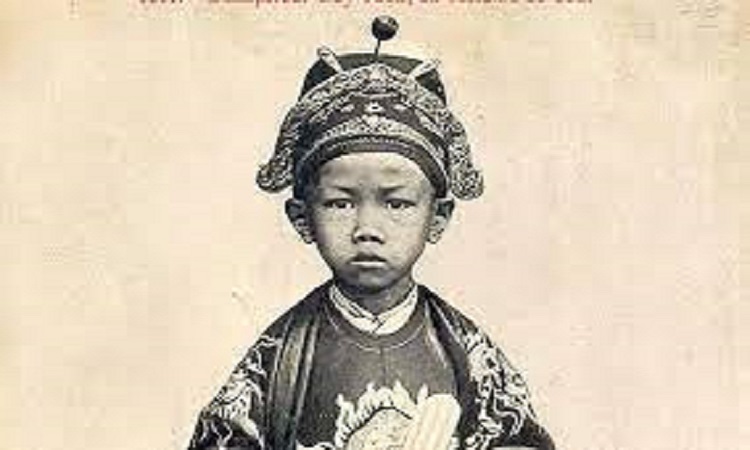
When his father was exiled by the French colonialists, he was taken to the throne by the French when he was a child - 7 Year Old. However, he gradually asserted his noncooperation with France. In 1916, while there was a Great War in Europe, he secretly contacted the leaders of the Vietnamese Quang Phuc Association such as Thai Phien and Tran Cao Van, who planned to revolt. The attempt failed and Duy Tan was arrested on May 6 and on November 3, 1916, he was restrained on the island of Réunion in the Indian Ocean.
During World War II (1939 - 1945) he joined the Allies against the Nazis. On December 26, 1945, he died in a plane crash in the Central African Republic, aged 45 years old. On April 24, 1987, his body was taken from Réunion to Vietnam, then taken to his burial place at Duc Duc Mausoleum, Hue next to the tomb of Thanh Thai's father. He has no sign.
12. Emperor Khai Dinh: Real Name was Nguyen Phuc Buu Dao. He ruled the country for 9 years from 1916 to 1925.
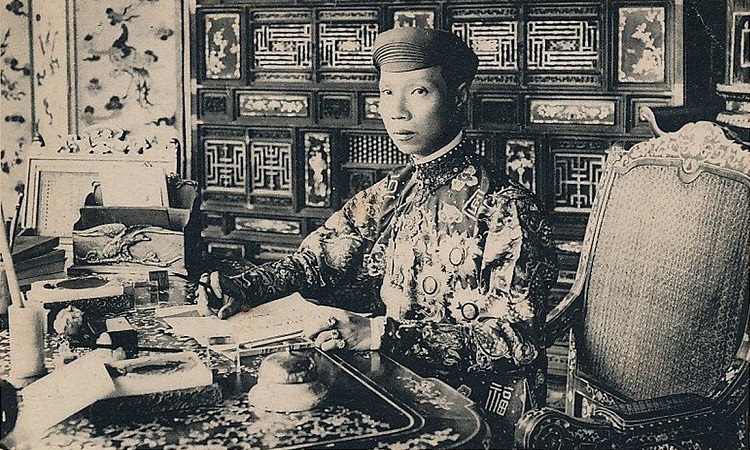
In 1889, Dong Khanh died, Buu Dao was still young, so he was not allowed to succeed (the successor was Thanh Thai). In 1906, Buu Dao was named Phung Hoa Cong. He was a gambler, often losing, sometimes having to sell both appliances and servants. Buu Dao even arrested his wife, the daughter of high-ranking mandarin Truong Nhu Cuong, to ask for money from her parents to pay debts to gamble.
The Buu Dao crowning was not completely smooth. After accusing the Emperor Duy Tan, the French had wanted to abolish the monarchy in Vietnam but the courtiers, especially the high-ranking Nguyen Huu Bai refused, so France had to give in. On May 18, 1916, Buu Dao ascended the throne to take the reign as Khai Dinh.
Khải Định suffered poor health like his father and became a drug addict. He died of tuberculosis in the Imperial City of Huế, according to his concubine Ba Phi, who described him as "not interested in sex" and "physically weak"
13. Emperor Bao Dai: Real Name was Nguyen Phuc Vinh Thuy. He ruled the country for 20 years from 1925 to 1945. Bao Dai was born October 22, 1913 and became the last emperor of Monarchy in Vietnamese history.
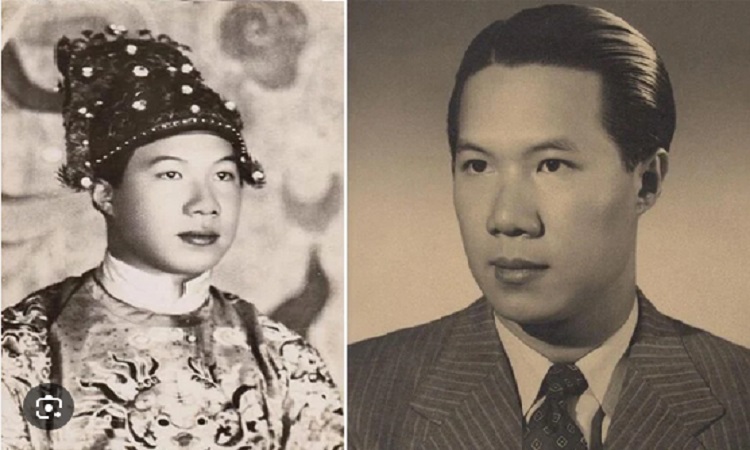
From 1922, Bao Dai was brought to France to study abroad. In 1925, when King Khai Dinh died, Bao Dai returned to Vietnam to take care of the funeral for his father and officially ascended the throne. However, after that, he still lived and studied in France until 1832, when he officially returned to the country to rule the country.
In 1945 after the August revolution, on August 30, King Bao Dai officially abdicated and handed over the leadership of the country to the government of the Democratic Republic of Vietnam of Ho Chi Minh. He became an advisor to the Ho Chi Minh government. A year later, he went to China and then moved to live in France until 1949, when he returned to Vietnam and became the Head of State for the French government.
In 1954, after the Geneva agreement, he was replaced by Ngo Dinh Dien and the Vietnam War began. He moved to live in France for the rest of his life. He died in 1997 in France when he was 83 years old. Emperor Bao Dai had 8 wives and 12 children: 5 princes and 7 princesses.
Recommended Tours:
- Hue City Tour 1 Day by Private Car and Dragon Boat Cruise
- Hue City Tour Half Day to Visit Imperial City & Royal Tombs
- Hue Motorbike Group Tour to Countryside vs Heritage Site
- Hue Imperial City Walking Tour Daily Group with Best Price
See Related Articles:
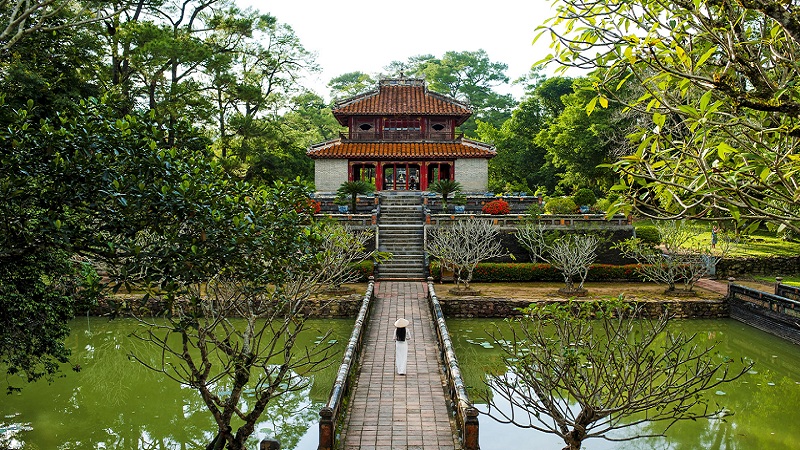
![]()
![]()
![]()
![]()
![]()
Best of Vietnam
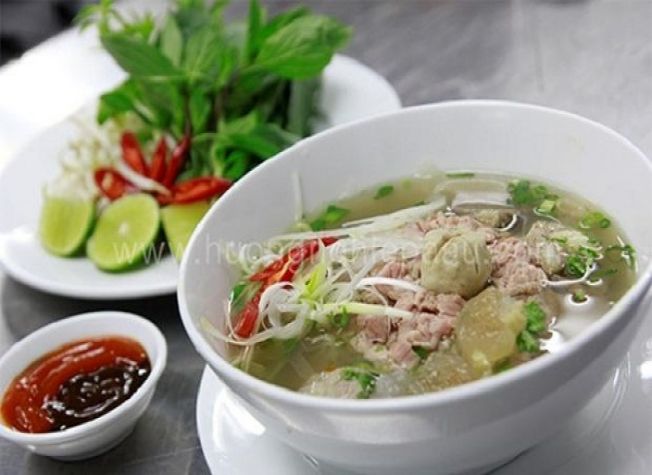
Best Vietnamese Food You Have to Try in Vietnam
Best Food in Vietnam: Vietnamese Traditional Food is top World well known to be both healthy and...

10 Best National Parks in Vietnam
Vietnam Travel Guide: If you look for the Best Wildlife Discovery Experience in Vietnam, here are...
Read More
Best Souvenir to Buy in Vietnam
If you look for Best Things to Buy when traveling to Vietnam to bring home for your family & friends...
Read More
The 10 Best Places to Visit in Vietnam
Vietnam Travel Guide: Home to an extensive collection of historical and cultural attractions,...
Read More
Top 10 Museums You Should Not Miss in Vietnam
Vietnam, 4.000 years old country has a unique and lengthy history, culture with 54 ethnic groups. It...
Read MoreFind your trip
Vietnam Best Tours
Vietnam Car Rental
Vietnam Travel Blog
- Vietnamese People: Origin, History, Culture and Traditions
- Vietnam Currency: Best ATM and Places to Exchange Money
- Vietnam Map: Regions, Cities & Provinces Map of Vietnam
- What is illegal Things in Vietnam: Rules & Laws for Tourists
- Best Time to Travel to Vietnam to Avoid the Bad Weather
- Vietnam News: Population & Religions of 54 Ethnic Groups









